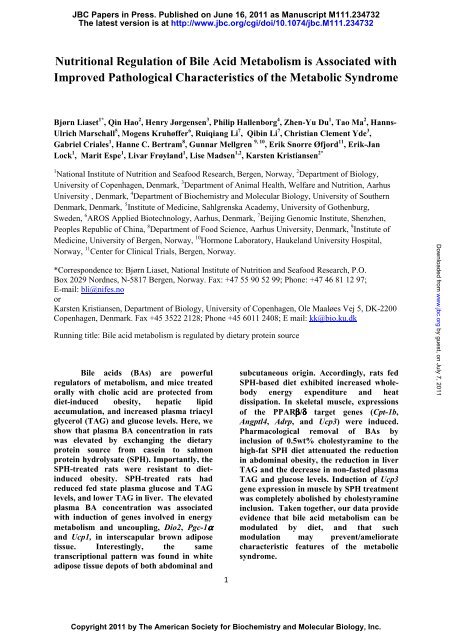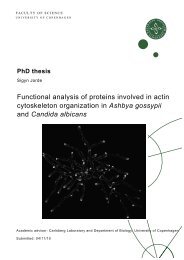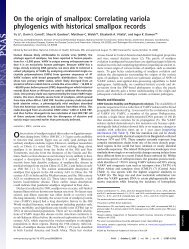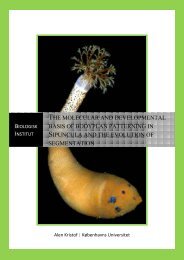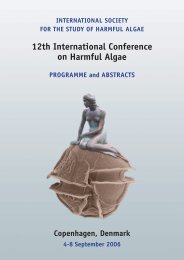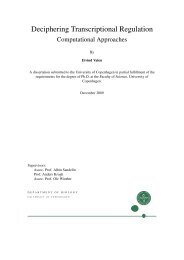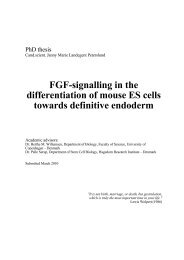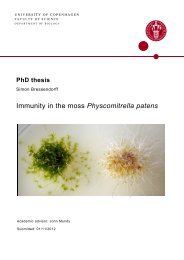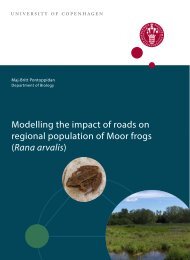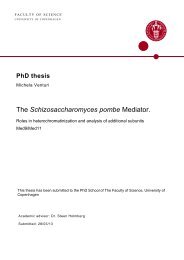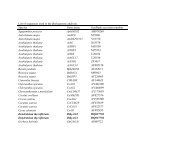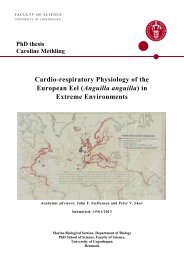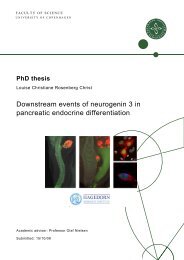The obesogenic effects of polyunsaturated fatty acids are dependent ...
The obesogenic effects of polyunsaturated fatty acids are dependent ...
The obesogenic effects of polyunsaturated fatty acids are dependent ...
Create successful ePaper yourself
Turn your PDF publications into a flip-book with our unique Google optimized e-Paper software.
JBC Papers in Press. Published on June 16, 2011 as Manuscript M111.234732<br />
<strong>The</strong> latest version is at http://www.jbc.org/cgi/doi/10.1074/jbc.M111.234732<br />
Nutritional Regulation <strong>of</strong> Bile Acid Metabolism is Associated with<br />
Improved Pathological Characteristics <strong>of</strong> the Metabolic Syndrome<br />
Bjørn Liaset 1* , Qin Hao 2 , Henry Jørgensen 3 , Philip Hallenborg 4 , Zhen-Yu Du 1 , Tao Ma 2 , Hanns-<br />
Ulrich Marschall 5 , Mogens Kruhøffer 6 , Ruiqiang Li 7 , Qibin Li 7 , Christian Clement Yde 3 ,<br />
Gabriel Criales 1 , Hanne C. Bertram 8 , Gunnar Mellgren 9, 10 , Erik Snorre Øfjord 11 , Erik-Jan<br />
Lock 1 , Marit Espe 1 , Livar Frøyland 1 , Lise Madsen 1,2 , Karsten Kristiansen 2*<br />
1 National Institute <strong>of</strong> Nutrition and Seafood Research, Bergen, Norway, 2 Department <strong>of</strong> Biology,<br />
University <strong>of</strong> Copenhagen, Denmark, 3 Department <strong>of</strong> Animal Health, Welf<strong>are</strong> and Nutrition, Aarhus<br />
University , Denmark, 4 Department <strong>of</strong> Biochemistry and Molecular Biology, University <strong>of</strong> Southern<br />
Denmark, Denmark, 5 Institute <strong>of</strong> Medicine, Sahlgrenska Academy, University <strong>of</strong> Gothenburg,<br />
Sweden, 6 AROS Applied Biotechnology, Aarhus, Denmark, 7 Beijing Genomic Institute, Shenzhen,<br />
Peoples Republic <strong>of</strong> China, 8 Department <strong>of</strong> Food Science, Aarhus University, Denmark, 9 Institute <strong>of</strong><br />
Medicine, University <strong>of</strong> Bergen, Norway, 10 Hormone Laboratory, Haukeland University Hospital,<br />
Norway, 11 Center for Clinical Trials, Bergen, Norway.<br />
*Correspondence to: Bjørn Liaset, National Institute <strong>of</strong> Nutrition and Seafood Research, P.O.<br />
Box 2029 Nordnes, N-5817 Bergen, Norway. Fax: +47 55 90 52 99; Phone: +47 46 81 12 97;<br />
E-mail: bli@nifes.no<br />
or<br />
Karsten Kristiansen, Department <strong>of</strong> Biology, University <strong>of</strong> Copenhagen, Ole Maaløes Vej 5, DK-2200<br />
Copenhagen, Denmark. Fax +45 3522 2128; Phone +45 6011 2408; E mail: kk@bio.ku.dk<br />
Running title: Bile acid metabolism is regulated by dietary protein source<br />
Bile <strong>acids</strong> (BAs) <strong>are</strong> powerful<br />
regulators <strong>of</strong> metabolism, and mice treated<br />
orally with cholic acid <strong>are</strong> protected from<br />
diet-induced obesity, hepatic lipid<br />
accumulation, and increased plasma triacyl<br />
glycerol (TAG) and glucose levels. Here, we<br />
show that plasma BA concentration in rats<br />
was elevated by exchanging the dietary<br />
protein source from casein to salmon<br />
protein hydrolysate (SPH). Importantly, the<br />
SPH-treated rats were resistant to dietinduced<br />
obesity. SPH-treated rats had<br />
reduced fed state plasma glucose and TAG<br />
levels, and lower TAG in liver. <strong>The</strong> elevated<br />
plasma BA concentration was associated<br />
with induction <strong>of</strong> genes involved in energy<br />
metabolism and uncoupling, Dio2, Pgc-1α<br />
and Ucp1, in interscapular brown adipose<br />
tissue. Interestingly, the same<br />
transcriptional pattern was found in white<br />
adipose tissue depots <strong>of</strong> both abdominal and<br />
1<br />
subcutaneous origin. Accordingly, rats fed<br />
SPH-based diet exhibited increased wholebody<br />
energy expenditure and heat<br />
dissipation. In skeletal muscle, expressions<br />
<strong>of</strong> the PPARβ/δ target genes (Cpt-1b,<br />
Angptl4, Adrp, and Ucp3) were induced.<br />
Pharmacological removal <strong>of</strong> BAs by<br />
inclusion <strong>of</strong> 0.5wt% cholestyramine to the<br />
high-fat SPH diet attenuated the reduction<br />
in abdominal obesity, the reduction in liver<br />
TAG and the decrease in non-fasted plasma<br />
TAG and glucose levels. Induction <strong>of</strong> Ucp3<br />
gene expression in muscle by SPH treatment<br />
was completely abolished by cholestyramine<br />
inclusion. Taken together, our data provide<br />
evidence that bile acid metabolism can be<br />
modulated by diet, and that such<br />
modulation may prevent/ameliorate<br />
characteristic features <strong>of</strong> the metabolic<br />
syndrome.<br />
Downloaded from www.jbc.org by guest, on July 7, 2011<br />
Copyright 2011 by <strong>The</strong> American Society for Biochemistry and Molecular Biology, Inc.


